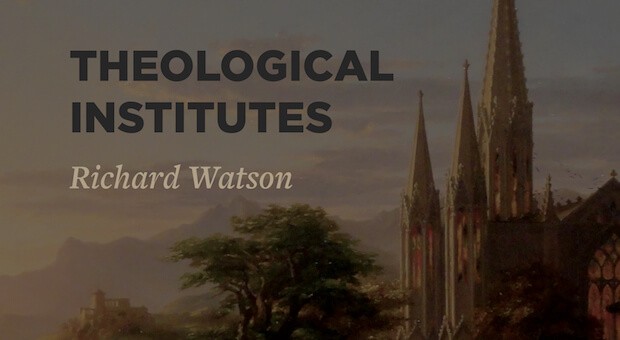Richard Watson’s Theological Institutes was a critical landmark in the development of Methodist doctrine. Originally published in 1831 in four volumes, Watson’s work was the first attempt to systematize John Wesley’s theology. Influencing and guiding the later systematic theological work for Methodist theology, Watson’s Institutes was the main Methodist textbook for systematic theological studies and remained a primary text for over 50 years after his death.
Ben Witherington III wrote an introduction to the new Lexham Classics edition of this seminal work. In this excerpt from the introduction, Witherington further examines the great legacy of Watson’s Institutes:
First published in 1831, not long before Richard Watson died, Theological Institutes quickly became the standard systematic theology for Methodists both in the United Kingdom and in the United States, garnering him the nickname “The Arminian Antidote.” The two-volume 1,200-page work is divided into four unequal parts in terms of word count. The first 236 are spent on the “Evidences of Christianity,” 815 on the “Doctrines of Christianity,” 104 on the “Morals of Christianity,” and a further 100 on the “Institutions of Christianity.”
The first thing to note is that he called his work the Institutes of Christianity, not the Institutes of Methodism. This is because Watson believed, following in the footsteps of Wesley, that he was simply reiterating what amounted to genuine primitive Christianity as revealed in the Scriptures. He was not trying to provide a particular denominational take on theology or ethics but rather passing on “the truth once given.” Nevertheless, it is clear enough at various junctures that Watson self-consciously cast his work in the mold of the systematic theologies of his day, and especially had one eye on John Calvin’s classic Institutes of the Christian Religion.
When Watson’s Institutes was published in 1831, it quickly became the standard by which Wesleyan theology was to be measured. So important was Watson’s Institutes, the first of its kind in the Methodist tradition, that it became the required textbook for all Methodist preachers on both sides of the Atlantic, even for circuit riders and local preachers in America. They were all expected to know John Wesley’s Standard Sermons and Watson’s Institutes.
Orthodox or Evangelical Methodism, and indeed Protestantism in general, owes Richard Watson a great debt. He showed that Methodist theology was not just “lay” theology or “revival” preaching but was just as capable of producing systematics as the Lutheran or Calvinist traditions—systematics that made sense especially of the doctrine of salvation without compromising the doctrines of original sin, God’s sovereignty and grace, or human responsibility for human actions and for responding to the gospel.
Watson reminds us that the Wesleyan view of God’s grace was that it was so sovereign that God could, should he choose, perfect human beings in love here and now, by which was meant cleansing the heart of all sin and filling it with unalloyed love from and for God. If God was sovereign, surely he could save to the uttermost, and one did not need to go to heaven to experience such perfect love. The optimism of grace was given more weight than the pessimism about fallen human nature. This is a theology we still need to ponder today.
* * *
Three new Lexham Classics volumes are on their way this fall, including this two-volume edition of Watson’s Institutes. Pre-order them all, today!





